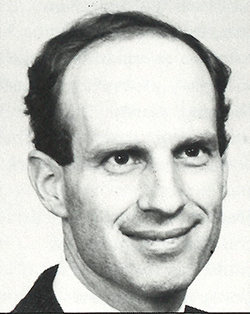Lawrence Hess, ’75, gets to safety from Iraq
 When Lawrence Lee Hess chose a career with the U.S. Foreign Service, he hoped he would have the opportunity to “watch history happen.” He got his wish.
When Lawrence Lee Hess chose a career with the U.S. Foreign Service, he hoped he would have the opportunity to “watch history happen.” He got his wish.
Hess, 39, received a bachelor’s degree in history from the UW in 1975. He had been legal and administrative officer in the United States Embassy in Baghdad for almost two years when Iraqi troops overran Kuwait Aug. 2. Nineteen days later, acting on information that the frontier was temporarily open, Hess and 17 other embassy employees made what he described as a “mad dash for the border” and crossed to safety in Jordan.
Hess’ wife, Victoria, had returned to the U.S. two months before to await the birth of their first child and he had been due to “rotate” home in mid-August. As it turned out, his plane landed in Washington, D.C. on Aug. 23 at almost the same moment his son, Richard, was born in a Washington-area hospital.
After the invasion Hess had worked almost around the clock assisting American citizens and helping prepare the embassy for “all contingencies.” Within a few days, however, the Iraqi government ordered the U.S. to reduce its embassy staff. Traveling in three embassy vans, Hess and his companions began the 300-mile journey in the cool of a desert night. They carried exit permits which they feared would be rejected by the Iraqi army at the border. “We fully expected to be turned back,” Hess recalls.
After about six hours on the road, with the temperature climbing toward 120 degrees, they arrived at the frontier. The dust was thick and water scarce. Perhaps 20,000 refugees “maybe with one suitcase on their back” were lined up in ragged rows under the eyes of Iraqi guards, armed with rubber hoses and other weapons. Television pictures cannot convey the scope and desperation of the refugees’ plight, Hess notes. Conditions at the border were chaotic. No one appeared to be in charge and each bureaucratic function—passport checks, vehicle inspections and obtaining final documents—was conducted in a separate office or booth, none with English-language signs.
After about four hours, they drove across the frontier and boarded a bus, sent by American officials in Jordan, for the six-hour trip to Amman. Hess and his family will move to Germany in April where he is slated to become vice consul.